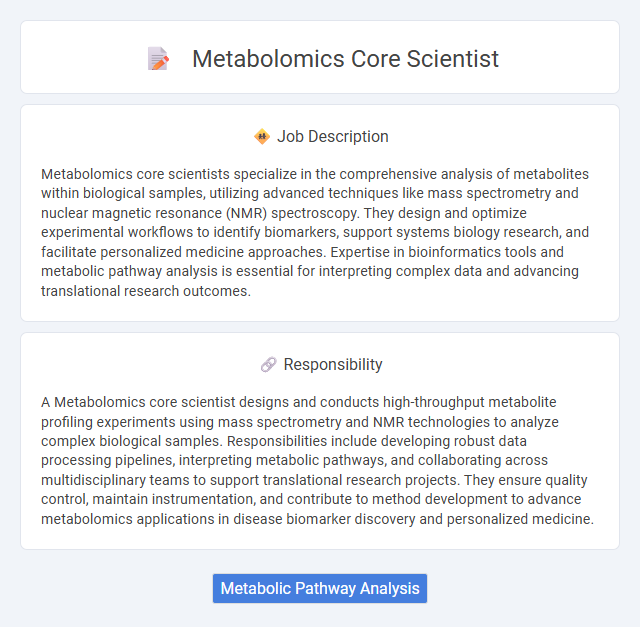
Metabolomics core scientists specialize in the comprehensive analysis of metabolites within biological samples, utilizing advanced techniques like mass spectrometry and nuclear magnetic resonance (NMR) spectroscopy. They design and optimize experimental workflows to identify biomarkers, support systems biology research, and facilitate personalized medicine approaches. Expertise in bioinformatics tools and metabolic pathway analysis is essential for interpreting complex data and advancing translational research outcomes.
Individuals with strong analytical skills and a background in biochemistry or molecular biology are likely well-suited for a Metabolomics core scientist role. Those who thrive in laboratory environments, enjoy working with complex data sets, and possess attention to detail may find this job particularly fitting. Candidates lacking a passion for research or struggling with meticulous experimental protocols might face challenges adapting to this position.
Qualification
A Metabolomics core scientist typically holds a Ph.D. in biochemistry, molecular biology, or a related field with extensive experience in mass spectrometry and nuclear magnetic resonance spectroscopy. Proficiency in data analysis software such as XCMS, MetaboAnalyst, and expertise in metabolic pathway analysis are essential. Strong skills in experimental design, sample preparation, and interpretation of metabolomic data are critical for advancing research and supporting interdisciplinary projects.
Responsibility
A Metabolomics core scientist designs and conducts high-throughput metabolite profiling experiments using mass spectrometry and NMR technologies to analyze complex biological samples. Responsibilities include developing robust data processing pipelines, interpreting metabolic pathways, and collaborating across multidisciplinary teams to support translational research projects. They ensure quality control, maintain instrumentation, and contribute to method development to advance metabolomics applications in disease biomarker discovery and personalized medicine.
Benefit
A career as a Metabolomics core scientist likely offers exposure to cutting-edge technologies and the chance to work on innovative projects that can impact healthcare and personalized medicine. Opportunities for interdisciplinary collaboration with biologists, chemists, and data scientists may enhance professional growth and skill development. The position probably provides access to advanced laboratories and resources, which can contribute to professional advancement and academic recognition.
Challenge
Metabolomics core scientists likely face challenges related to managing and interpreting complex datasets generated from high-throughput technologies, which require advanced bioinformatics skills and constant adaptation to emerging analytical tools. The intricacy of biological systems often complicates the identification of meaningful metabolic biomarkers, making data validation and reproducibility probable obstacles. Furthermore, collaborating across multidisciplinary teams may present difficulties in aligning project goals and ensuring effective communication of metabolomic insights.
Career Advancement
Metabolomics core scientists advance their careers by developing expertise in mass spectrometry, chromatography, and bioinformatics for comprehensive metabolite profiling. Progression often involves leading interdisciplinary research projects, securing grant funding, and publishing in high-impact scientific journals. Mastery of analytical techniques and data integration enhances opportunities for leadership roles in academic, pharmaceutical, or biotechnology sectors.
Key Terms
Metabolic Pathway Analysis
A Metabolomics core scientist specializing in metabolic pathway analysis utilizes high-throughput mass spectrometry and chromatography techniques to identify and quantify metabolites within complex biological samples. Expertise in bioinformatics tools like KEGG, MetaboAnalyst, and Cytoscape enables the reconstruction and interpretation of metabolic networks, facilitating the discovery of disease biomarkers and therapeutic targets. Collaborative projects often integrate multi-omics data to elucidate pathway dysregulation in metabolic disorders, cancer, and personalized medicine.
 kuljobs.com
kuljobs.com